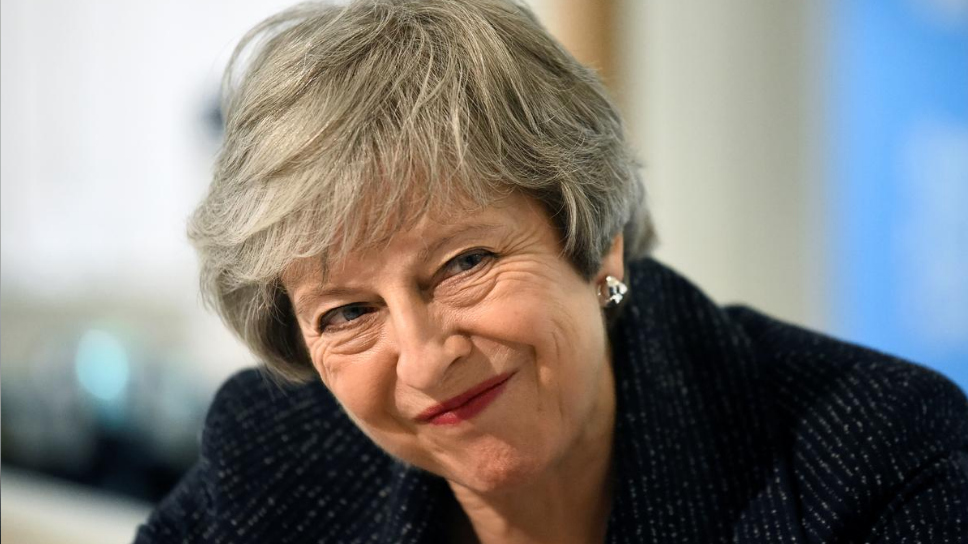
Britain's Prime Minister Theresa May visits a community center in Belfast, Northern Ireland, February 5, 2019. (Photo: CGTN / Reuters)
British Prime Minister Theresa May tried to break the deadlock over Brexit on Wednesday by thrashing out alternative proposals for the Irish border with political parties in Northern Ireland.
The UK is on course to leave the EU on March 29 without a deal unless May can convince the bloc to reopen the divorce deal she agreed in November and then sell it to skeptical British lawmakers.
As companies and governments across Europe step up preparations for the turmoil of a no-deal exit, diplomats and officials said the UK now faces three main options: A no-deal exit, a last-minute deal or a delay to Brexit.
At meetings in Belfast, May tried to tackle the biggest obstacle to getting a deal ratified by the British parliament – an insurance policy covering the possible future arrangements for the border between EU-member Ireland and the British province of Northern Ireland.
"We will find a way to deliver Brexit that honors our commitments to Northern Ireland," the prime minister said on Tuesday.
May said she would seek an alternative arrangement which avoids the need for a hard border or legally binding changes to the border backstop to introduce a time limit or create an exit mechanism.
May to Brussels
As a way to prevent a hard border, Brussels and London agreed on a so-called backstop – basically a promise that unless the sides come up with a better idea then the UK would remain bound by EU market and customs rules so that goods would not have to be checked.
But the Northern Irish party which props up May's minority government says it could endanger the province's place in the UK, while Brexit supporters in May's Conservative Party worry it would lock the country into EU rules for the long term.
British ministers, The Sun newspaper said, have been examining a plan drawn up by Japan's Fujitsu to track trade across the border, while the Telegraph said ministers had discussed delaying Brexit by eight weeks.
May is due to meet European Commission President Jean-Claude Juncker and then European Council President Donald Tusk in Brussels on Thursday.
But diplomats in Brussels said they had heard no new proposals from London and the risk of a no-deal exit was increasing. EU leaders, diplomats said, were frustrated at May's failure to build a consensus on Brexit.
Delaying Brexit would extend rather than resolve the uncertainty that is hurting the economy, Britain's business minister Greg Clark told a parliament committee on Wednesday.
UK lawmaker to May: Get Brussels to talk and we will give you more time
May will be given more time by her Conservative Party to negotiate Brexit with the EU if she can convince Brussels to talk, a lawmaker involved in discussions with the government said on Wednesday.
A group of Conservative lawmakers from both wings of May's deeply divided party bypassed her last week to come up with a compromise plan that called on the prime minister to return to Brussels and reopen the most contentious element of the exit agreement - the Northern Irish backstop.
Speaking to journalists on Wednesday, the lawmakers behind the plan said their proposal was being taken seriously, describing intensive talks with government to flesh it out as May prepares for meetings in Brussels on Thursday.
One of the group said if May could demonstrate that the EU was willing to renegotiate, she would buy herself some more time and avoid a potential flashpoint in parliament next week when she returns to report her progress.
Northern Irish UUP: May is exploring time limit for backstop
May discussed putting a time limit on the so-called Irish border backstop in talks with Northern Ireland's Ulster Unionist Party, the party's leader said on Wednesday.
"She spoke to us today about putting a time limit on the backstop. We don't see a time limit as being the answer, because time limit can be extended," Robin Swann said after the meeting, adding that it was just one of the options raised by May.
"While she seems to be talking about looking at alternative arrangements, her reluctance to move past the 29th of March, I think is going to put a lot of pressure on what Westminster can do."


